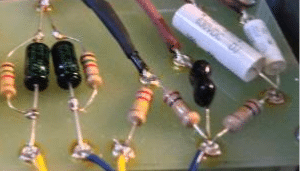
So, you’re interested in hand wired guitar amps. You probably have been asking yourself if they’re better than those made with a printed circuit board (PCB) and wondering if they’re worth the extra money.
The short answer is that they can be better, but not always. This article will take you through everything you need to know to get you up to speed, so keep reading if you’re curious to learn more.
You can use the table of contents below to take you to the area that interests you. Click on the little box to open it, and then click on the section of the article you want to read, or you can read from start to finish if you want the full hand-wired guitar amp experience!
You can click here to go directly to the list of hand-wired guitar amps I think really rock!
What Are Hand Wired Guitar Amps?
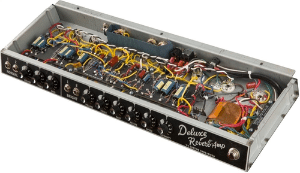
Hand-wired guitar amps are generally taken to mean that the electronic circuitry is installed and soldered by hand, not machine populated onto printed circuit boards.
However, there are various ways of making hand-wired guitar amps.
Electronic components can be soldered directly to one another in a “point-to-point” configuration or hand-soldered to different types of boards, like eyelet and turret boards.
Point-to-point wiring was the original method in the electronics industry when devices were simple, and the electronic components were large.
As the electronics industry continued to evolve, electronic components got smaller, and the circuitry got more complex; hand-wiring components to eyelet and turret boards were eventually replaced with printed circuit boards, except for “boutique” guitar amps and other audio equipment.
Point-To-Point Vs. Eyelet And Turret Board
I remember plugging my first Sears Silvertone electric guitar into the amplifier in my dad’s old (late 1940s) RCA movie projector. It sounded richer than my little 1960s Sears amp that was built for guitars! How could it have a better tone? I took apart both amps and noticed one big visual difference. The projector amp had point-to-point wiring, and my amp had eyelet wiring.
However, not all point-to-point amps sound better than other types of hand-wired models. To make things more complicated, some “hand-wired amps” can use a combination of point-to-point for some components and eyelet or turret boards for others.
Point-to-point wiring does not use any boards to solder components. Instead, they are wired by soldering them to each other. Typically components are centered around vacuum tube sockets or switches and wired to them to give the electrical circuit more structural stability.
Eyelet boards have “rivet-like eyelets” where component leads are inserted, bent, and hand-soldered. The leads can go in any direction, from eyelet to eyelet.
Turret boards use vertical connectors to wrap and solder components instead of bending their leads. They are no better or worse than using eyelet boards, just another way of doing things.
Hiwatt ’60s to early ’70s models and Carr amps feature point-to-point wiring. Some ’60s British amps like Vox favored turret board designs.
Fender used eyelet board to wire their amps until the late 1980s, after which they switched to PCB.
Guitar amplifier manufacturers still use all three methods to hand-wire circuits, and a combination of point-to-point, eyelet, and turret may be used in the same amplifier design.
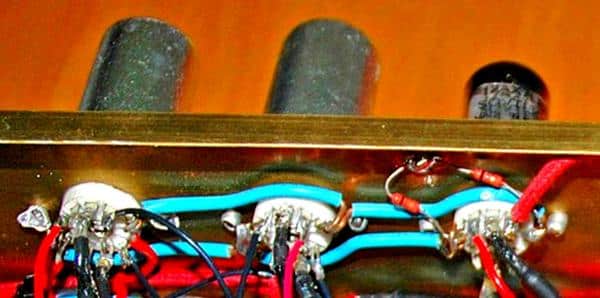
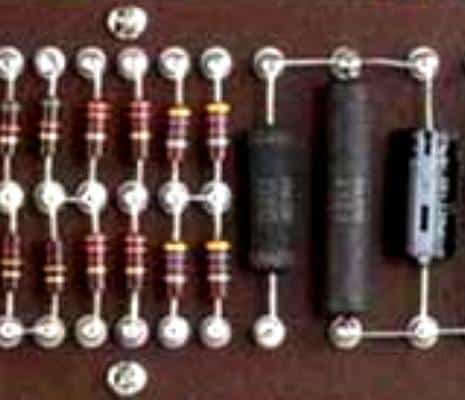
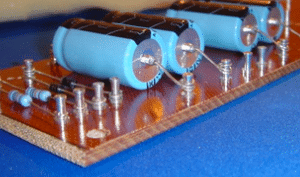

What Makes Hand Wired Guitar Amps Better?
Not all amps that are totally hand-wired are better, but here are some reasons you might like their tone and responsiveness.
More attention to detail during the manufacturing process can mean enhanced reliability and less time in the shop being serviced. True point-to-point wiring may be easier and less time-intensive to service than a printed circuit board design.
Hand-wiring the circuitry can allow you to use larger electronic components, like resistors and capacitors, which can give you a better tone.
I tend to favor the tone and dynamics of hand-wired guitar amps, with notable exceptions, but ultimately it’s your call!
Print Circuit Board (PCB) Wiring
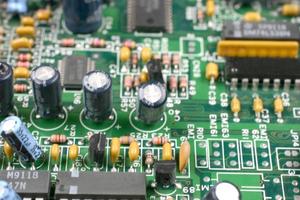
This method of wiring became popular sometime after World War II. Automating the board’s component population and soldering process allowed manufacturers to keep up with the demand for electronic devices at more affordable prices.
The majority of guitar amplifiers today are made using printed circuit boards. They are ideally suited for complex electronics, especially devices that utilize integrated circuits and processor chips.
Reducing the number of solder connections in an optimized circuit design can mean higher signal integrity. It also gives a repair tech the option of simply replacing an entire board rather than troubleshooting its components individually.
In guitar amplifiers, printed circuit boards can be single or double-sided to make things more compact. Amplifiers that feature onboard amp and effect simulations require PCBs to hold the processing chips necessary to create the electronic firepower to make them sound organic and dynamic.
Hybrid (PCB And Hand Wired) Guitar Amps
It’s not uncommon for guitar amplifiers to use a combination of printed circuit boards and hand-wired components to make high-quality guitar amplifiers. This can give you the best of both worlds in terms of tone, component layout, and serviceability.
For example, hand wiring tube sockets can give you better isolation of heat dispersion and increased reliability, while using quality PCBs for other components can provide consistency.
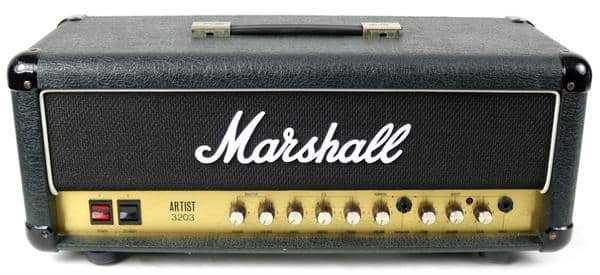
I own a Marshall Artist 3203 half-stack. It is a 30-watt hybrid Class A/B amp with a solid-state pre-amp section and rectifier. On the amp side, it uses a 12AX7 phase inverter and two EL-34 power tubes. I love the sound of this amp, which was made in the early 80s!
Vox hand-wired amps are also amazing. I had a chance to play through a vintage ’60s Vox AC-30, which made my Strat sound incredible!
These days, companies like Tone King (Royalist) and Marshall (Astoria) make exceptional sounding hybrid amplifiers.
What Amp Design Gives The Best Tone?
Inevitably tone is in the ear of the player and listener, but hand-wired amps can undoubtedly give you your money’s worth. To me, tone and note dynamics are the most important considerations when buying an amp.
This is one of the biggest and longest-running guitar amp debates among design experts and professional players. With hybrid amps becoming increasingly popular, the debate may soon be moot!
Some excellent tube-driven models use PCB and hybrid designs if you don’t have the budget for an all-hand-wired amp.
What About Road-Worthiness?
Road-Worthiness has more to do with things like amplifier chassis and cabinet design, but circuit layout also comes into play.
Electronic components must be securely housed and protected against vibration and being dropped. Using things like high-quality tubes, switches, and PCBs with extra thick material and robust copper tracks can make all the difference.
In the end, hand-wired amps are not necessarily more road-worthy than PCB or Hybrid amps. It depends on the design, materials, and manufacturing process.
Hand Wired Guitar Amps That I Like

Here are some of the hand-wired guitar amps that I’ve played through or heard on-stage. I plan on doing a buying guide and individual product reviews for each of them in the near future.
- Fender ’64 Custom Deluxe Reverb
- Marshall 1974X Tube Combo
- Vox AC15HW1X
- Matchless Laurel Canyon 112r
- Carr Super Bee
If you’re in the market for an absolutely amazing-sounding amp with point-to-point wiring, check out my article on Carr Super Bee Review – Classic Blackface Sound On Steroids!.

Disadvantages Of Hand Wired Guitar Amps
Here are some of the downsides of hand-wired amps.
- Typically more expensive than PCB and hybrid amps
- Not usually as many “bells and whistles” on the control panel
- Challenging to reproduce the circuit layout exactly (the way a PCB can)
- May not be as practical as a PCB for more complex amplifier designs
- Can take up more space in an amp chassis than PCB

Beware Of Resale Value!
Although some vintage guitar amps in good condition are worth a fortune, there’s no guarantee that if you pay a lot of money for a new hand-wired amp that it will increase significantly in resale value down the road.
The best reason to buy a hand-wired amplifier is because you really like the way it sounds and performs. Great-sounding amps can be passed down through generations of family players or sold when the time is right.
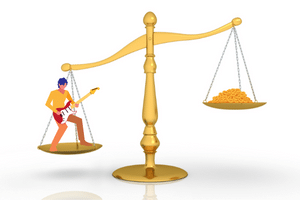
Are Hand Wired Guitar Amps Legit?
Absolutely! They are great amps for any type of guitar and genre of music.
However, I wouldn’t recommend purchasing an amp simply because it is hand-wired unless you are a serious collector.
Play a variety of amps of all designs and choose the one that sounds best to you and fits your budget. You might be surprised what a hybrid or PCB-wired amp can do for your playing.
Also, if you are a tube amp player, be aware that it doesn’t have to be hand-wired to sound great.

Frequently Asked Questions
Here are some of the questions I get asked about guitar amps.
If your question does not appear here, please put it in the comments, and I will get right back to you with an answer.
What Makes An Amplifier More Powerful?
Power consumption and output volume (how loud an amplifier actually is) are not necessarily the same things. Output volume depends on an amp’s design characteristics. Some 5 Watt guitar amps can be incredibly loud for their power rating.
Tube amplifiers are generally louder than solid-state amplifiers with the same output power rating.
Are Hand Wired Guitar Amps Louder Than Other Amps?
No, not necessarily. High-powered amps are generally louder than low-powered amps, irrespective of the construction method. Hand-wiring an amplifier can be more beneficial for tone and reliability.
A hand-wired amp can be louder than a hybrid or PCB-wired amp with the same power rating, but not always.
Do Amplifiers Lose Power Over Time?
Yes, an amplifier can lose its power (and loudness) over time as component parts age and wear out, especially tubes. This can also affect an amplifier’s tone.
If your amplifier has component parts or speakers replaced, it can lower its resale value, especially if it is a vintage model. Remember to keep all the old parts.
Is It Dangerous To Service Hand Wired Amps Yourself?
Yes, it can be dangerous to service any guitar amplifier if you do not know what you are doing. Live tubes have grid plate voltages in excess of 500 Volts, and electrolytic capacitors (caps) can store high voltages, even with the amplifier unplugged.
If your amplifier does not sound as loud or as good as it used to, bring it to a certified repair shop to get it looked at.
Do You Need A Fuse For Hand Wired Guitar Amps?
Yes, all guitar amplifiers should have a fuse or circuit breaker. Most of the vintage hand-wired amps have fuses, although some of them may be inside the chassis (not visible from the outside).
Check its fuse or circuit breaker if your amplifier does not power up and is connected to a proper power source. Bring it to a certified repair shop if it won’t power up.

Final Thoughts On Hand Wired Guitar Amps
Hand-wired guitar amps can be point-to-point construction, where all the electronic components are soldered to one another or wired to eyelet and turret boards.
One type of hand-wired method is not necessarily better than the other. Both have their pros and cons.
Printed circuit board (PCB) construction allows electronic circuit production to be automated and more cost-effective. High-quality PCBs can be as good or better than hand-wiring an amplifier.
The hybrid component design incorporates the combination of hand-wiring and printed circuit boards. In some cases, it may offer the best of both worlds.
Hand-wired amps can be old (vintage) or new. Many vintage hand-wired amps are collector items that sell for a premium. There’s no guarantee that a new hand-wired amp will have an excellent resale value down the road.
Tone, road-worthiness, and reliability are not always improved when it comes to hand-wired amplifiers. However, in my personal experience, I find hand-wired amps superior in sound quality compared to most others.
Hand-wired amps do have some downsides, including cost, “lack of bells and whistles,” and practicality.
There is no right or wrong when choosing a guitar amplifier. I recommend you play through various amplifiers of various designs and buy the one that sounds best with the guitar you play and fits into your budget.

Please help me celebrate the fact that this is my 100th article by leaving a comment in the section below!

Tell Me What You Think
Please leave a comment below if you enjoyed this article, have any questions about guitar amplifiers, or want to give your point of view. I will be happy to help you.
- Do you own (or have owned) a hand-wired guitar amp? Which one(s)? What did you think?
- What is your favorite guitar amp of all time in any design? Why?
- What do you think are the pros and cons of a hand-wired amp?
- What else is on your mind?



Well Frank I stumbled across your post on Hand wired guitar amps, and I think you covered the topic very well. I don’t have much experience with amps other than my little 5 watt PCB (I learned that from your post) for my slide guitar. I can honestly say that for my needs a hand wired guitar amp is probably not in my budget and given my ears are not what they used to be means I probably would not know the difference in quality. For those with the budget and the ears to pick the quality difference, I say hand wired guitar amps may be for you. Good Post
Hi, James
Thank You for your comments!
I totally agree; if your amp sounds great to you, there is no reason to get a hand-wired one. Your ears are probably better than you think! You can always mic your amp into a PA system if you need more volume, but 5 Watts amps can be pretty loud.
I have many amps that are PCB or hybrid-wired, and they all have great sound, so I would never part with any of them.
Frank
Hi there my name is Michelle and I think you have done a really good job on building your website, it said you had done 100 articles, that’s crazy, good for you. I don’t know much about amps personally but I know they make everything sound better with the right amp and that I need one in my car, lol. I hope you continue to grow your website and it gives you everything you want in return.
Hi, Michelle
Thank You for your comments!
BTW, if you are looking to upgrade the sound system in your car and don’t have experience in this area, I suggest you check out the website Crutchfield. I have been using them for years for car and home audio. They sell high-quality equipment, are very knowledgable, and helpful.
Frank
This is an excellent article on determining if hand wired guitar amps will be beneficial or not. A person certainly does not want to waste any money unless they are achieving better results that are cost effective. The movement to smaller and smaller parts is the biggest reason circuit boards are used in the industry and why hand wiring has diminished in popularity. True point-to-point wiring seems to be a great choice for those that value their amplifier and want to be able to maintain it easily and yet have the flexibility to use resistors and capacitors which provide a better tone. Getting the best sound out of your guitar is especially important if you are recording it for business production purposes.
Hi, Toplink
Thank You for your comments!
Hand-wired amplifiers are a popular choice, especially among professional players. I have several hand-wired amps and can hear the difference in the tone!
It’s definitely something for any player to consider when choosing a new amp.
Frank